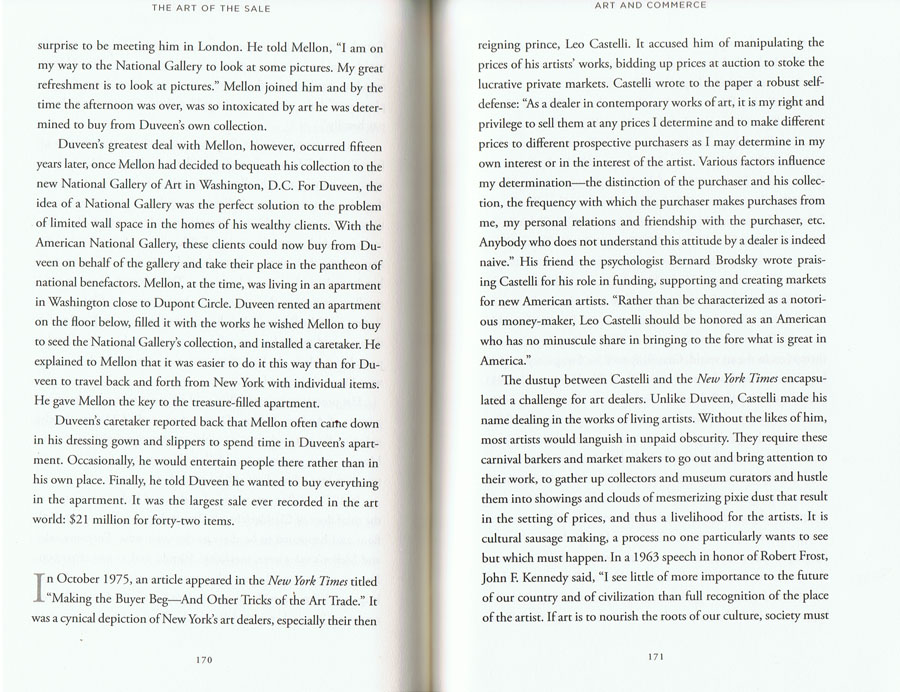The Art of the Sale
Learning From The Masters About The Business of LifePhilip Broughton
Couple interesting anecdotes about buying in Moroccan bazaar. Seller will notice everything about you - the wear on yr wedding ring, state of yr teeth, or the slightest sign of vanity or nerves. He will give you lightning fast answers to questions, adopt sad expressions, an try to get you to name the first price. Best thing you can do is act bored, and make him give you price first (and them just smile when he does).
"Don't be surprised if bargaining sounds like warfare. It is a war of words which the best man wins. Him, not you. And if you doubt that, try selling back to him what you just bought."
Guy describes old process by which his father and grandfather used to buy fabrics. They would inspect the cloth, the seller would stay for dinner and then the negotiations would begin. Within minutes the seller would pack up all his goods, fart, and waft the smell into buyers faces, then storm off. A few days later he would be back. More dinner, more shouting and arm waving and storming off. The whole process would take days, but eventually there wd be a deal. A few days later anew salesman wd arrive and the whole process wd begin again.
Research on PTSD showed that traumatic events do't inevitably lead to trauma. Many of us can put bad events in perspective ourselves, count our blessings and move on. Various factors can produce resilience: supportive family, good friends, experience at handling stress or hardship. Resilience is "being committed to finding a meaningful purpose in life, the belief that one can influence the outcome of events, and the belief that one can learn and grow from both positive and negative life experiences."
More books on Mind
Great salesmen accept rejection and failure as essential to building the muscles they need for eventual success. They see rejection as a vaccine that strengthens their ability to resist the personal battering inevitable in a life of sales.
All there is to selling is to be likable and be a good storyteller. The best salesmen are seductive in different ways with different clients, tapping a range of dramatic story lines in their pitch, eliciting one emotional response after another. First they ask a few key questions to touch one emotion or another.
"You get women who come in every day, shopaholics for whom buying is their drug. These are the kinds of people who invite salespeople to their parties because they actually think they are their friends."
The ability to seduce is both empowering and corrupting. One explanation of Bill Clinton that his self-destructive behaviors driven in part by a need to test his powers, his ability to charm people into forgiving even his most unforgivable flaws.
A great storyteller can be dangerous. "We hire people who seem effervescent and bubbly, but they suffer a lot from mood swings. Their drug is to make the sale. They get emotional and dramatic."
A good salesman does three things. First he seduces the prospect, sifting quickly through the prospect's emotions and fantasies to see which one will be satisfied by his product. Then he provides the legal justification for buying the product. Finally he applies the pressure to close, and win the sale. These three steps of education, rationalization and closing require different talents. The seducer may not have the dominance to close. The rationalizer may not make an emotional connection. The closer may be too much of a bully to seduce.
Top salesmen incapable of loyalty. Their charm has often made them immature, spoiled by always getting what they want. They are commercial Hannibal Lectors, highly attuned to other's needs and yet vicious in exploiting them. Psychopaths understand other people very well, but unlike rest of us, that empathy is not restrained by sharing what the victims feel. The successful salesman is not a lot different - empathizing, but taking advantage of what he sees to make a sale.
Insurance salesman who said to his prospects "You'll have the same problems when I walk out as you had when I walked in .... unless you let me take your problems with you." Varied his pitch to the problem client wanted fixed. If they had children, it became a way to pay for college. If they had a business, it was a way to secure it to be passed to next generation.



Buyout specialist said managing sales was hardest part of company. Could buy a company and reengineer its balance sheet in his sleep. Redoing manufacturing and supply chain was harder, but doable. But major problem finding ales manager and team that was biddable, whose actions matched the owner's intentions. Usually they just carried on doing whatever they'd one somewhere else, and hired same kind of salesmen, rather than understanding new situation.
Sales starts with a conversation - finding common ground.
And you have to understand the decision-making process - figuring out who is important. Start by looking in the carpark to see who's car is parked where, to decode hierarchies.
Books by Title
Books by Author
Books by Topic